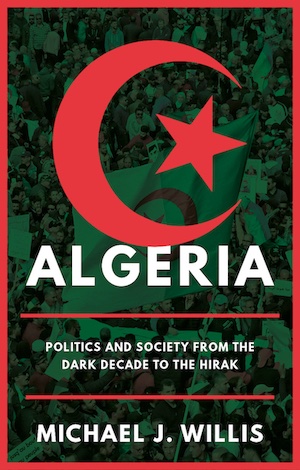By Fred H. Lawson
Of all the countries of the Middle East and North Africa, Algeria is the most enigmatic. Its president suffered a debilitating stroke in April 2013, leaving him unable to walk or speak. He was nevertheless re-elected by an overwhelming margin a year later. Its armed forces exercise a decisive influence in politics, yet elections are hotly contested and minority communities routinely mobilize to resist initiatives enacted by the central government. Its fiercely patriotic intellectuals express their thoughts primarily in French, the language of the despised colonial power. It prides itself a champion of revolutionary Third Worldism, but acts as a pragmatic mediator in international conflicts.
Most studies of Algeria situate these contradictions either in the complex legacy of French colonialism or in the eventful period between independence in 1962 and the outbreak of civil war between the government and militant Islamists in 1992. Colonial exploitation left deep wounds, which were aggravated rather than remediated by the vicious war for independence. The first three decades after victory over France saw the consolidation of the dominant state-party-military alliance, the expansion of hydrocarbons production, and the fashioning of an egalitarian, self-sufficient local economy. Yet as Michael Willis cogently observes, “To still primarily view and portray Algeria sixty years after its independence through the lens of colonialism not only gives undue and dubious power to that colonialism but arguably serves to deny the agency and autonomy of Algerians after 1962.” One might say something similar about the country’s undeniably momentous first decade of self-rule.
Willis’ meticulous, accessible survey of contemporary Algerian affairs is therefore especially welcome. The book provides readers new to the subject with enough background, but concentrates on the period after April 1999, when the veteran nationalist leader Abdelaziz Bouteflika assumed the presidency. These years saw an end to the civil war and a steady stream of income from hydrocarbons exports, which together immunized the country against the popular uprisings that swept across the region beginning in the winter of 2010-11. They also witnessed the transformation of the domestic economy from a broadly socialist order to a privatized system in which individuals closely connected to the presidency amassed huge fortunes, while the livelihoods of industrial workers, agricultural laborers, and skilled professionals markedly deteriorated.
In early 2019, after political contention had dissipated or been crushed in other parts of the Middle East and North Africa, widespread popular discontent in Algeria exploded into large-scale, recurrent protests, which took the name “the movement” (al-Hirak). The protests shook the country’s dominant coalition to its core and prompted the armed forces to eject President Bouteflika and pledge to clean out pervasive official corruption. Whether or not the authorities will actually follow through on that pledge remains an open question, even though several prominent businesspeople have been convicted of fraud and sentenced to lengthy terms in prison.
Algeria played a crucial role in regional and global diplomacy throughout the 1960s and 1970s, but dropped out of sight during the 1990s. Internal warfare in neighboring Libya and Mali, in addition to festering tension with Morocco over the disputed Western Sahara and heightened Turkish and Saudi involvement along the country’s southern borders, is likely to draw Algiers out of dormancy in the near future. The constitution has quietly been amended to permit the armed forces to take part in foreign peacekeeping operations, a striking shift away from strict adherence to the principle of non-intervention. This authoritative overview offers a pertinent set of briefing papers for anyone who wishes to prepare for Algeria’s return to prominence.
Fred H. Lawson (ΦBK, Indiana University) is professor of government emeritus of Mills College.




